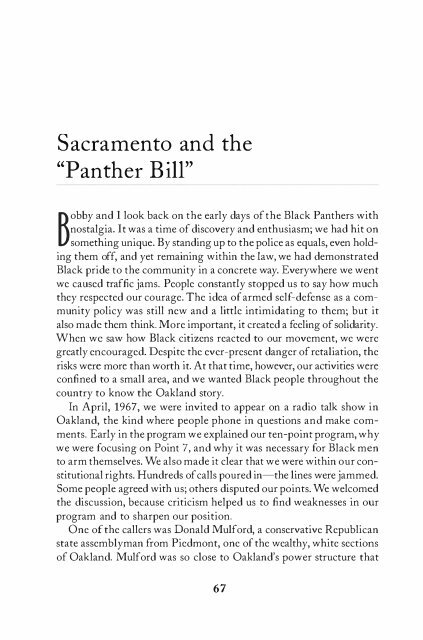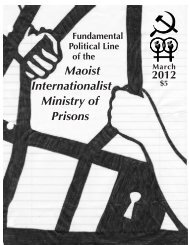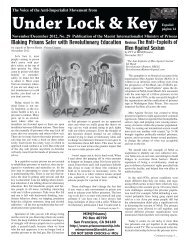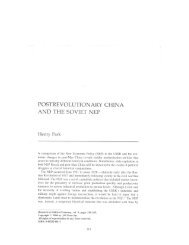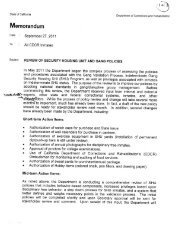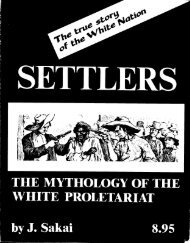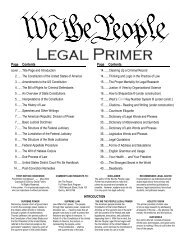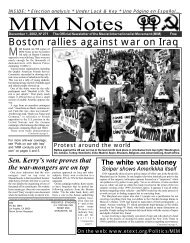- Page 2 and 3:
THE READER Edited by David Hilliard
- Page 4 and 5:
[orpword by [rpMa Npwton ..... . .
- Page 6 and 7:
torewora HUEY P. NEWTON and the Bla
- Page 8 and 9:
10 I The Hue v P. Newton Reader
- Page 10 and 11:
12 I The Hue v P. Newton Reader
- Page 12 and 13: 14 I The Hue v P. Newton Reader
- Page 14 and 15: 16 I The Hue v P. Newton Reader
- Page 16 and 17: 18 I The Hue v P. Newton Reader
- Page 18 and 19: tOne TheHrst Steps
- Page 20 and 21: sconng • lfirst studied law to be
- Page 22 and 23: sconngl changing was an art I devel
- Page 24 and 25: sco nngl manifestation of freedom.
- Page 26 and 27: sconngl bookstore took them away fr
- Page 28 and 29: sconngl I emphasized this uncertain
- Page 30 and 31: sconngl tively. I said to him, "Don
- Page 32 and 33: sconngl let me stay out on bail whi
- Page 34 and 35: fr eedom regation, isolation, and s
- Page 36 and 37: fr eedom scream; I would not apolog
- Page 38 and 39: fr eedom came into his cell and thr
- Page 41: 46 I The Hue v P. Newton Reader
- Page 44 and 45: the founding of the Black Panther P
- Page 46 and 47: the founding ofthe Black Panther Pa
- Page 48 and 49: patrolling t was the spring of 1966
- Page 50 and 51: OaOB[R 1966 BlACK PANmR PARTY PlATf
- Page 52 and 53: people to dissolve the political ba
- Page 54 and 55: patrolling At first, the patrols we
- Page 56 and 57: patrolling back at us in some way-a
- Page 58 and 59: patrolling strapped to his hip in f
- Page 60 and 61: patrolling a pig, and threatening t
- Page 64 and 65: Sacramento and the "Panther Bill"l
- Page 66 and 67: Sacramento and the "Panther Bill"l
- Page 68 and 69: • • cnSIS: October 28, 1967 hen
- Page 70 and 71: crisis: October 28,19671 75 Everywh
- Page 72 and 73: crisis: October 28,19671 I gave to
- Page 74 and 75: trial he morning my trial began, on
- Page 76 and 77: tria'i 81 was in session there were
- Page 78 and 79: tria'i 83 ent, difficult as they we
- Page 80 and 81: tria'i 85 a condition being that I
- Page 82 and 83: tria'i 87 about twenty witnesses to
- Page 84 and 85: tria'i 89 nine-millimeter casings f
- Page 86 and 87: tria'i 91 tion's case it seems incr
- Page 88 and 89: tria'i 93 standing over him and fir
- Page 90 and 91: GRIER: I do, sir. I do. JENSEN: Obj
- Page 92 and 93: GRIER: I could have, Counselor. GAR
- Page 94 and 95: tria'i 99 view, Ross's insistence o
- Page 96 and 97: tria/ilol so Garry played the whole
- Page 98 and 99: tria'1103 bly have killed Frey. Yet
- Page 100 and 101: tria'1105 try for everybody. It is
- Page 102 and 103: tria'1107 part of any understanding
- Page 104 and 105: tria'1109 been submitted during the
- Page 106 and 107: tria/I 111 employment, then the mea
- Page 108 and 109: tria/I 113 but that the terms of my
- Page 110 and 111: tria/I 115 Jensen made another mist
- Page 112 and 113:
tria'1117 White America, listen! Wh
- Page 114 and 115:
tria'1119 son to feel we were losin
- Page 116 and 117:
Verdict of the jury. We, the jury i
- Page 118 and 119:
tria'I123 because they did not know
- Page 120 and 121:
that when he comes to class to talk
- Page 122 and 123:
FOLLOWING THE OPENING months of Hue
- Page 124 and 125:
1321 The Hue. P. Newton Reader ity,
- Page 126 and 127:
from "In Defense of Self Defense"
- Page 128 and 129:
1361 The Hue. P. Newton Reader vici
- Page 130 and 131:
from "In Defense of Self Defense"
- Page 132 and 133:
140 The Hue. P. Newton Reader I has
- Page 134 and 135:
the correct handling of a revolutio
- Page 136 and 137:
1441 The Hue. P. Newton Reader appr
- Page 138 and 139:
1461 The Hue. P. Newton Reader The
- Page 140 and 141:
1481 The Hue. P. Newton Reader ing
- Page 142 and 143:
on the Peace Movement: August 15, 1
- Page 144 and 145:
152lThe Hue. P. Newton Reader tries
- Page 146 and 147:
prison, where is thy victory?: Janu
- Page 148 and 149:
156lThe Hue. P. Newton Reader it is
- Page 150 and 151:
158lThe Hue. P. Newton Reader ever
- Page 152 and 153:
speech delivered at Boston College:
- Page 154 and 155:
1621 The Hue. P. Newton Reader need
- Page 156 and 157:
1641 The Hue. P. Newton Reader the
- Page 158 and 159:
1661 The Hue. P. Newton Reader to s
- Page 160 and 161:
1681 The Hue. P. Newton Reader seiz
- Page 162 and 163:
170 I The Hue. P. Newton Reader tio
- Page 164 and 165:
1721 The Hue. P. Newton Reader In 1
- Page 166 and 167:
1741The Hue. P. Newton Reader final
- Page 168 and 169:
Prt Three The Second Wave
- Page 170 and 171:
intercommunalism: February 1971 e,
- Page 172 and 173:
intercommunalism 1183 basic con tra
- Page 174 and 175:
intercommunalism 1185 the land spac
- Page 176 and 177:
intercommunalism 1187 Empire becaus
- Page 178 and 179:
intercommunalism 1189 ••• Que
- Page 180 and 181:
intercommunalism 1191 Well, then, d
- Page 182 and 183:
intercommunalism 1193 in a highly d
- Page 184 and 185:
intercommunalism 1195 dialectics at
- Page 186 and 187:
intercommunalism 1197 tell you what
- Page 188 and 189:
intercommunalism 1199 That brings u
- Page 190 and 191:
on the d(ection ofEldridge Cleaver
- Page 192 and 193:
on the d(ection ofEldridge Cleaver
- Page 194 and 195:
on the d(ection ofEldridge Cleaver
- Page 196 and 197:
on the d(ection ofEldridge Cleaver
- Page 198 and 199:
statement: May 1, 1971 he original
- Page 200 and 201:
statementl211 in a manner which ser
- Page 202 and 203:
statementl213 The political vehicle
- Page 204 and 205:
on the relevance of the church 1215
- Page 206 and 207:
on the relevance of the church 1217
- Page 208 and 209:
on the relevance of the church 1219
- Page 210 and 211:
on the relevance of the church 1221
- Page 212 and 213:
on the relevance of the church 1223
- Page 214 and 215:
on the relevance of the church 1225
- Page 216 and 217:
Black capitalism re-analyzed I: Jun
- Page 218 and 219:
Black capitalism re-analvsed II229
- Page 220 and 221:
Black capitalism " re-analvsed JI23
- Page 222 and 223:
Black capitalism re-analvsed II233
- Page 224 and 225:
uniting....f!:.gainst a common enem
- Page 226 and 227:
uniting....f!:.gainst a common enem
- Page 228 and 229:
uniting....f!:.gainst a common enem
- Page 230 and 231:
fallen comrade: eulogy for George J
- Page 232 and 233:
eulo or Geor e ackson 243 I had alm
- Page 234 and 235:
S!!.l2.gyfor George Ta ckson 1245 F
- Page 236 and 237:
Glide along the horizons, Casting n
- Page 238 and 239:
on Pan-Africanism or communism 1249
- Page 240 and 241:
on Pan-Africanism e or communism 12
- Page 242 and 243:
on Pan-Africanism or communism 1253
- Page 244 and 245:
on Pan-Africanism or communism 1255
- Page 246 and 247:
the technology question 1257 to dev
- Page 248 and 249:
the technology question 1259 tionar
- Page 250 and 251:
the technology question 1261 dogs a
- Page 252 and 253:
the technology question 1263 What w
- Page 254 and 255:
the technology question 1265 It is
- Page 256 and 257:
a spokesman for the people: in conv
- Page 258 and 259:
in conversation with William F. Buc
- Page 260 and 261:
in conversation with William F. Buc
- Page 262 and 263:
in conversation with William F. Buc
- Page 264 and 265:
in conversation with William F. Buc
- Page 266 and 267:
in conversation with William F. Buc
- Page 268 and 269:
in conversation with William F. Buc
- Page 270 and 271:
in conversation with William F. Buc
- Page 272 and 273:
in conversation with William F. Buc
- Page 274 and 275:
Eldridge Cleaver: he is no James Ba
- Page 276 and 277:
Eldrid e Cleaver: he is no ames Bal
- Page 278 and 279:
Eldrid e Cleaver: he is no ames Bal
- Page 280 and 281:
BY TIlE MIDDLE 19705 the Black Pant
- Page 282 and 283:
2961 The Hue. P. Newton Reader Such
- Page 284 and 285:
2981 The Hue. P. Newton Reader the
- Page 286 and 287:
300 I The Hue. P. Newton Reader for
- Page 288 and 289:
3021 The Hue. P. Newton Reader net
- Page 290 and 291:
dialectics of nature: 1974 The subj
- Page 292 and 293:
3061 The Hue. P. Newton Reader swif
- Page 294 and 295:
3081 The Hue. P. Newton Reader In t
- Page 296 and 297:
310 I The Hue. P. Newton Reader Uta
- Page 298 and 299:
3121 The Hue. P. Newton Reader ist,
- Page 300 and 301:
3141 The Hue. P. Newton Reader deni
- Page 302 and 303:
3161The Hue. P. Newton Reader provi
- Page 304 and 305:
3181The Hue. P. Newton Reader nizan
- Page 306 and 307:
320 I The Hue. P. Newton Reader as
- Page 308 and 309:
3221 The Hue. P. Newton Reader Shor
- Page 310 and 311:
3241 The Hue. P. Newton Reader pris
- Page 312 and 313:
3261 The Hue. P. Newton Reader Offe
- Page 314 and 315:
3281 The Hue. P. Newton Reader The
- Page 316 and 317:
330 I The Hue. P. Newton Reader zes
- Page 318 and 319:
3321 The Hue. P. Newton Reader have
- Page 320 and 321:
3341 The Hue. P. Newton Reader farm
- Page 322 and 323:
3361 The Hue. P. Newton Reader (197
- Page 324 and 325:
3381 The Hue. P. Newton Reader bag
- Page 326 and 327:
340 The Hue. P. Newton Reader I tor
- Page 328 and 329:
342 The Hue P. Newton Reader toms p
- Page 330 and 331:
3441 The Huey P. Newton Reader Sinc
- Page 332 and 333:
3461 The Huey P. Newton Reader The
- Page 334 and 335:
3481 The Hue. P. Newton Reader tria
- Page 336 and 337:
350 The Huey P. Newton Reader I In
- Page 338 and 339:
3521The Hue. P. Newton Reader the b
- Page 340 and 341:
3541The Hue. P. Newton Reader house
- Page 342 and 343:
3561The Hue. P. Newton Reader More
- Page 344 and 345:
358 The Hue P. Newton Reader which
- Page 346 and 347:
publication history Portions of the
- Page 348 and 349:
3621 The Huey P. Newton Reader Fone
- Page 350 and 351:
Beginning with his founding of the


